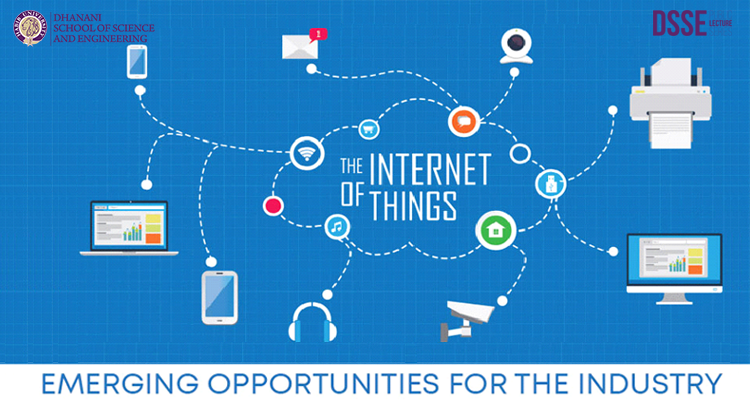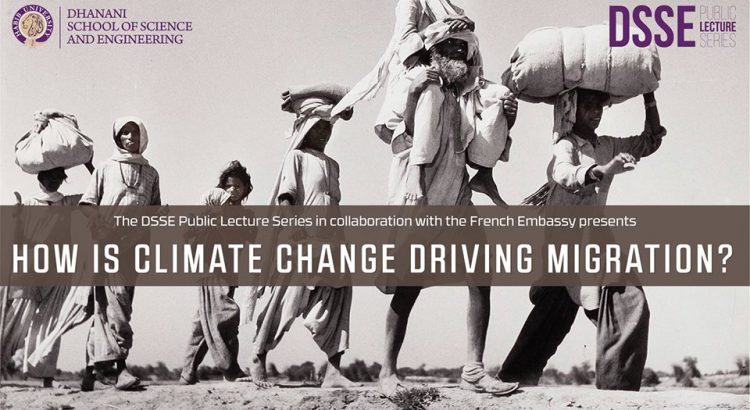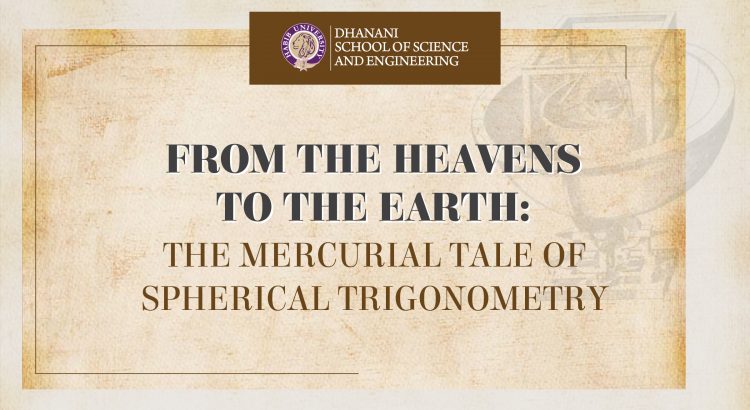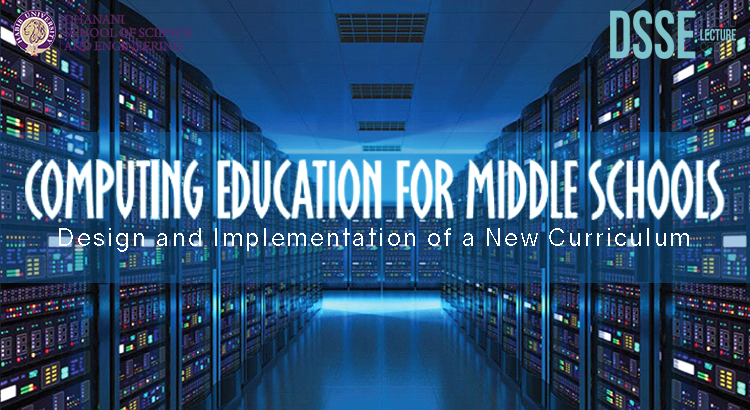October 17th, 2019 Saquib Razak introduced himself as an Embedded Software Engineer and Associate Teaching Professor at Carnegie Mellon University, Qatar. Mr. Razak did his Masters from University of Texas and then received his Ph.D. in Computer Science at the State University of New York. He came to Pakistan to present an ambitious project on […]
Category: SSE Public Lecture Series

INTERNET OF THINGS (IOT): EMERGING OPPORTUNITIES FOR THE INDUSTRY
11th October 2019 at Tariq Rafi Hall, Habib University, a panel discussion on Internet of Things (IoT) was arranged through the collaboration of the IoT company Linked things and Habib DSSE program. Linked Things CEO, Sophia Hasnain, an Embedded Systems engineer was present, along with the managing Director of RapidCompute, Imran Khan. The program manager […]

5G NETWORKS: WHAT‘S DIFFERENT? WHY THE HYPE?
3rd October, 2019 The lecture hall clamoured with engineering students and faculty members. Tech-enthusiasts and telecommunication experts, some of which joined as external guests, also formed part of the audience. Dr. Shan Jaffry stood centre stage preparing to expose the expectant listeners to the wonders of technology from the future. The subject of the lecture […]

HOW IS CLIMATE CHANGE DRIVING MIGRATION?
Dr. Alice Baillat is a specialist of the geopolitics of Climate Change, and currently also a research fellow at IRIS. She holds a Ph.D. in Political Science and International Relations from Sciences Po Paris. She also holds a research master in International relations from Paris 1-Panthéon Sorbonne University. Her research mostly focuses on the migratory consequences of climate change, and international climate negotiations. She takes a closer look at the specific situation and needs of the most vulnerable developing countries and their negotiation strategies.

The Role of Undergraduate Research in Pakistan
By: Ayman Babar
(Student 2020 , School of Arts, Humanities and Social Sciences, Habib University)
A symposium titled “The Role of Undergraduate Research in Pakistan” was hosted by the Dhanani School of Science and Engineering on 28th September, 2018 as part of a two-day celebration to honor the Dhanani family and their generous endowment for the School of Science and Engineering. With Dr. Waqar Saleem, Program Director for Computer Science at Habib University as moderator, the panel consisted of prominent professionals Dr. Kulsoom Ghias, Dr. Sabieh Anwar and Dr. Amir Hasan intently discussing the importance of research at the undergraduate level, the barriers it faces and the way forward.

FROM THE HEAVENS TO THE EARTH: THE MERCURIAL TALE OF SPHERICAL TRIGONOMETRY
By: Fatima Durrani – Social Development and Policy Major 2020
(Student, School of Arts, Humanities and Social Sciences, Habib University)
Dr. Glen Van Brummelen is an internationally acclaimed Canadian historian of mathematics specializing in historical applications of mathematics to astronomy. On the 7 of August, Dr. Brummelen brought to Habib University his rich and wide berth of knowledge of Mathematics and Astronomy and presented it to an audience of over fifty students, mathematics enthusiasts and professors in a DSSE Public Lecture. This lecture, titled ‘FROM THE HEAVENS TO THE EARTH: THE MERCURIAL TALE OF SPHERICAL TRIGONOMETRY’ was an in-depth summary of his renowned book- first one, to be accurate- with the same title (The Mathematics of the Heavens and the Earth: The Early History of Trigonometry). His book has enjoyed extreme success in the academic circles and is a further testament to his mastery in this arena.

Speed to Inspire (Collaboration with the FERN Team from NUST)
The SSE Public Lecture Series kicked off this semester with a student-led talk and panel discussion, moderated by a student, Zuha Sohail, in which car-making teams from PNEC-NUST and Habib University sat together to relate the ups and downs and twists and turns in the journey to making their dream car.
The students also engaged in a mentorship session of sorts where the students of the PNEC-NUST team, who had already finished their car and won the Formula 1 Competition with their Electric Racing Car, talked to students of Habib University who were in the process of making their own fuel-efficient car.

Cyber Security by Shahmeer Amir
By: Amal Hashim – Social Development and Policy Major 2020
(Student, School of Arts, Humanities and Social Sciences, Habib University)
TechPen’s latest talk – “Do We Need to Make Our Cyber Connections More Secure Than Before?” by Shahmeer Amir – was an overwhelmingly engaging and interesting talk. The audience was enamored by the speaker who in turn answered all the questions and queries of the audience properly and in terms they could understand. The talk itself stayed on the same pattern with Shahmeer Amir, world-renowned ethical hacker and now researcher into cyber security systems, making sure that the information he was giving out was correct and up-to-date.
The talk was an eye-opener for the common people who had as yet been unaware of the possibilities and importance of cyber security. Shahmeer talked about Stuxnet, a virus used by the US Government to hack into Iran’s nuclear database. Using that as a basis, he went on to elaborate on the topic of how physical weapons could be controlled via computer software systems and how dangerous this was to governments and economies.
Replicating Silicon Valley in the Indus Valley
By: Amal Hashim – Social Development and Policy Major 2020
(Student, School of Arts, Humanities and Social Sciences, Habib University)
But is it even possible?
According to the panelists, Ms. Jehan Ara of the Nest I/O, Suleyman Shahid faculty advisor from LUMS University for Technology for People Initiative, and Muneeb Maayr, CEO of Bykea and Co-Founder of Daraz.pk, and Imran Moinuddin, CEO of Nexdegree, Dr. Suleman Shahid, at Habib University’s SSE Public Lecture Series talk “Replicating Silicon Valley in the Indus Valley, it is not.
However, creating another technological and business hub within Pakistan keeping in mind all its unique factors is possible sometime in the future. In fact its foundations are being laid currently, according to Ms. Jehan Ara, and an awareness of having a sustainable entrepreneurial ecosystem is gradually rising.
STEM Education: A Pedagogical Tool to Teach the Learners in a Digital Age
By: Amal Hashim – Social Development and Policy Major 2020
(Student, School of Arts, Humanities and Social Sciences, Habib University)
Reflections on ” STEM Education: A Pedagogical Tool to Teach the Learners in a Digital by Zartaj”
Zartaj Waseem, a STEM Educational professional and software engineer, is the Co-Founder of Robotics Labs which is the first STEM Education Center in Pakistan. As Zartaj Waseem explained through the course of her talk, STEM is a trans-disciplinary approach to teaching the hard sciences. In this regard this is much like Habib University’s inter-disciplinary approach to its courses.
